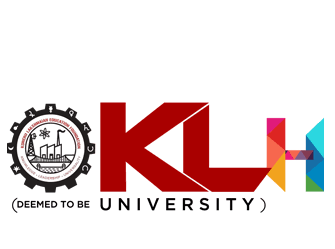 Vision :
Vision :
- To be the leading Business School in India, Globally Recognized for Excellence in Education and Research.
 Mission:
Mission:
- Relentless focus on impact on the students through a balance between Theory & Application
- Creating Platform for Flexible Learning Journey (F L J).
- Boundary Less Education through Online and ODL system.
- Promoting Research, Innovation and Consultancy through Centers of Excellence.
- Career Transformation through continuous tailor-made programs from Certificate to Doctoral programs
- Practicing Honesty through transparent Communication, operations and Approach

About MBA

KL University is a highly reputed institution of India. It has been awarded with UGC- Category 1 status. It ranks 12th in the Top 140 Engineering Institutions in India in the Times Engineering Survey 2019. KL University has been functioning since 1980. It has recently started it’s off campus center at Hyderabad in 2018, with the approval of UGC & AICTE. It is located near Telangana State Police Academy (TSPA) Junction on Chilkuru Road, Aziz Nagar, and Hyderabad. KLH MBA is a destination for globally reputed programs with unique features and with world class faculty with PhD in their respective domains. It has achieved 100% placements with highest annual package of Rs. 10 Lakhs. The Faculty of Business is recognized for a holistic approach to business education at a global level. We provide flexible and innovative educational and research opportunities with strong ties to the business community. We offer courses at an undergraduate, postgraduate and higher-degree research level from a range of business-related disciplines. As a faculty we develop professionals, managers and business leaders with critical thinking skills so that they can succeed (and maximize their potential) in their chosen fields.
MBA PROGRAM EDUCATIONAL OBJECTIVES
KLBS offers two years MBA program with the following specializations, subjected to the fulfillment of requirements as specified in the guidelines.
Specializations offered
- Human Resource Management
- Marketing Management
- Finance Management
MBA Dual Specialization
KLBS offers two years MBA program with dual specializations, subjected to the fulfillment of requirements as specified in the guidelines.
Specializations
- MBA Finance + Business Analytics
- MBA Marketing + Digital Marketing
Academic Programs (PEOS)
To be a globally renowned university, as per our vision, we need to produce quality products (graduates) into the market who have potential strengths to meet all the professional and personal challenges prevailing at global levels and who can serve in all the possible positions of their respective job domains and contribute towards holistic growth of their respective employment providers as well as the nation, world. The graduates must also possess cutting edge R&D skills in their domain areas.
This, is exactly what has been framed into the University’s Mission and thereby the Mission has converged into the following Program Educational Objectives (PEOs) which are best suited to Post-graduate Management program, and are those that compliment the university vision, mission.
PROGRAM EDUCATION OBJECTIVES:
- Make students to apply techniques of business analysis, data management and problem-solving skills in order to support business management decision-making in the field of relevance.
- Inculcate leadership skills needed for implementing and coordinating organizational activities and managing change to explore business problems in depth for developing their functional knowledge to think strategically and to lead, motivate and manage teams across borders.
- Nurture with abilities to integrate business knowledge and management techniques to aid planning and control in a changing environment and to enhance better career paths.
These PEOs are designed to be attained by all the post-graduates within 2 years of their education
| PEO | MISSION | ||||
| To attain leadership in Management Education | To attain leadership in Research | To attain leadership in Consultancy | To nurture the students industry ready | To make the students as a responsible citizen of nation. | |
| Make students to apply techniques of business analysis, data management and problem-solving skills in order to support decision-making | Yes | Yes | Yes | Yes | |
| Inculcate leadership skills needed for implementing and coordinating organizational activities | Yes | Yes | |||
| Managing change to explore business problems in depth for developing their functional knowledge | Yes | Yes | Yes | ||
| To think strategically and to lead, motivate and manage teams across borders | Yes | Yes | Yes | Yes | |
| Nurture with abilities to integrate business knowledge and management techniques | Yes | Yes | Yes | Yes | |
| To aid planning and control in a changing environment and to enhance better career paths. | Yes | Yes | Yes | Yes | |
PROGRAM OUTCOMES (PO’s)
| PO Number | Description |
| 1.Core Business Knowledge | Able to synthesize the knowledge, management skills, and tools acquired in the program, which will be helpful to shape the organizations effectively. |
| 2.Career Planning and Decision Making | Able to excel in their chosen career paths, by learning on how to live, adapt and manage business environmental change through decision making. |
| 3.Critical Thinking and Leadership | Able to reflect upon and explore business and research problems in depth, to demonstrate leadership skills and to demonstrate ability to pursue new knowledge necessary to succeed in dynamic domestic and international business environments. |
| 4. Manager & Society | Able to emerge as efficient managers equipped with innovation, rationality and application oriented decision-making in the context of the ever-changing business environment. |
| 5. Team Building &Business Communication | Able to communicate effectively and to perform different roles efficiently as an individual or in a team in multi-disciplinary streams with entrepreneurial edge. |
| 6.Business perspective and Sustainability | Able to gain an understanding of professional, legal, financial, marketing, production & operational activities, logistics, ethical, social issues and responsibilities |
| 7. Application of Statistical and Analytical tools | Able to gain knowledge of contemporary issues and develops an art of using current techniques, skills and necessary analytical tools for managerial practice. |
Articulation Matrix with Course Outcomes
Articulation matrix for the academic Year 2022-2023
Articulation matrix for the academic Year 2021-2022
Articulation matrix for the academic Year 2020-2021
Articulation matrix for the academic Year 2019-2020
Articulation matrix for the academic Year 2018-2019
MBA PEO – PO & PSO MATRIX
| PO | PEO | ||
| Make students to apply techniques of business analysis, data management and problem-solving skills in order to support business management decision-making in the field of relevance. | Inculcate entrepreneurial &leadership skills needed for implementing and co-ordinating organizational activities and managing change to explore business problems in depth for developing their functional knowledge to think strategically and to lead, motivate and manage teams across borders. | Nurture with abilities to integrate business knowledge and management techniques to aid planning and control in a changing environment and to enhance better career paths. . | |
| 1.Core Business Knowledge | Yes | Yes | |
| 2.Career Planning and Decision Making | Yes | Yes | Yes |
| 3.Critical Thinking and Leadership | Yes | ||
| 4. Manager & Society | Yes | ||
| 5.Team Building & Business Communication. | Yes | ||
| 6.Business perspective and Sustainability | Yes | ||
| 7. Application of Statistical and Analytical tools | Yes | Yes | |
| PSO’s | |||
| Inculcate leadership, managerial and entrepreneurial competencies and strengthen their expertise in implementation of strategies and the management of complex situation. | Yes | Yes | Yes |
| Will develop professional skills that prepare them for immediate employment and for life-long learning in advanced areas of management and related fields | Yes | Yes | Yes |
OBJECTIVES OF THE UNIVERSITY (ACADEMICS)
| Academics | O1 | To offer academic flexibility by means of Choice based credit systems and the like. |
| O2 | To identify and introduce new specializations and offer programs in emerging areas therein | |
| O3 | To incorporate into the curriculum the Application orientation and use high standards of competence for academic delivery | |
| O4 | To design and implement educational system adhering to outcome based International models. | |
| O5 | To introduce and implement innovation in teaching and learning process to strengthen academic delivery | |
| O6 | To offer academic programs at UG, PG, doctoral, Post-Doctoral which are industry focused, and incorporates Trans-discipline, inter-discipline aspects of the education system | |
| O7 | To deliver higher education that includes technologies and meeting the global requirements |
Mapping of PEOs with Objectives /Goals of the University
| Objectives/Goals | ||||||||
| PEO | PEO-Description | O1 | O2 | O3 | O4 | O5 | O6 | O7 |
| PEO1 | Make students to apply techniques of business analysis, data management and problem-solving skills in order to support business management decision-making in the field of relevance.
| Yes | Yes | Yes | Yes | Yes | ||
| PEO2 | Inculcate leadership skills needed for implementing and coordinating organizational activities and managing change to explore business problems in depth for developing their functional knowledge to think strategically and to lead, motivate and manage teams across borders.
| Yes | Yes | Yes | Yes | Yes | Yes | |
| PEO3 | Nurture with abilities to integrate business knowledge and management techniques to aid planning and control in a changing environment and to enhance better career paths.
| Yes | Yes | Yes | Yes | |||
MBA Program Thrust/Focussed areas as per APIIC, Telangana Industrial policy, CII, NSDC, Planning commission, UGC, US O*NET, World Economic Forum, UNESCO.
| Local Needs identified as per policy document of APIIC from 2011 to 2016 | Regional Needs as per policy documents of APIIC & Telangana Industrial policy upto 2016 | National Needs as per policy documents of CII, NSDC, Planning commision,UGC from 2011 to 2016 | Global Needs as per policy documents of US O*NET, World Economic Forum, UNESCO from 2011 to 2016 | |||||||
| L1 | Skill Development | R1 | Ease of doing business by introducing Information Technology | N1 | Strategy development in line to Nation's Cause | G1 | Global village | |||
| L2 | Optimizing Public/Private Investments | R2 | Maintain Good governance | N2 | Oriented to produce graduates to meet the needs of Indian economy | G2 | Develop Organizational Policies | |||
| L3 | Maintain Cordial industrial relations | R3 | Designing Investor friendly policies | N3 | Optimizing Public/Private Investments | G3 | Human Capital Management | |||
| L4 | Customized MIS reports for monitoring at different levels | R4 | Focus on global business | N4 | Adopting IT to encourage SME's | G4 | Analyze market or customer related data. | |||
Mapping of PEOs with Local, Regional, National and Global needs
| Curricula developed have relevance | Local Needs | Regional | National Needs | Global Needs | |||||||||||||
| PEO | PEO-Description | L1 | L2 | L3 | L4 | R1 | R2 | R3 | R4 | N1 | N2 | N3 | N4 | G1 | G2 | G3 | |
| PEO1 | Make students to apply techniques of business analysis, data management and problem-solving skills in order to support business management decision-making in the field of relevance. | Yes | Yes | Yes | Yes | ||||||||||||
| PEO2 | Inculcate leadership skills needed for implementing and coordinating organizational activities and managing change to explore business problems in depth for developing their functional knowledge to think strategically and to lead, motivate and manage teams across borders. | Yes | Yes | Yes | Yes | Yes | Yes | Yes | Yes | Yes | Yes | ||||||
| PEO3 | Nurture with abilities to integrate business knowledge and management techniques to aid planning and control in a changing environment and to enhance better career paths. | Yes | Yes | Yes | Yes | Yes | |||||||||||
MBA Program Thrust/Focussed areas as per APIIC, Telangana Industrial policy, CII, NSDC, Planning commission, UGC, US O*NET, World Economic Forum, UNESCO.
| Local Needs identified as per policy document of APIIC from 2011 to 2016 | Regional Needs as per policy documents of APIIC & Telangana Industrial policy upto 2016 | National Needs as per policy documents of CII, NSDC, Planning commision,UGC from 2011 to 2016 | Global Needs as per policy documents of US O*NET, World Economic Forum, UNESCO from 2011 to 2016 | |||||||
| L1 | Skill Development | R1 | Ease of doing business by introducing Information Technology | N1 | Strategy development in line to Nation's Cause | G1 | Global village | |||
| L2 | Optimizing Public/Private Investments | R2 | Maintain Good governance | N2 | Oriented to produce graduates to meet the needs of Indian economy | G2 | Develop Organizational Policies | |||
| L3 | Maintain Cordial industrial relations | R3 | Designing Investor friendly policies | N3 | Optimizing Public/Private Investments | G3 | Human Capital Management | |||
| L4 | Customized MIS reports for monitoring at different levels | R4 | Focus on global business | N4 | Adopting IT to encourage SME's | G4 | Analyze market or customer related data. | |||
Mapping of PEOs with Local, Regional, National and Global needs
| Curricula developed have relevance | Local Needs | Regional | National Needs | Global Needs | |||||||||||||
| PEO | PEO-Description | L1 | L2 | L3 | L4 | R1 | R2 | R3 | R4 | N1 | N2 | N3 | N4 | G1 | G2 | G3 | G4 |
| PEO1 | Make students to apply techniques of business analysis, data management and problem-solving skills in order to support business management decision-making in the field of relevance. | Yes | Yes | Yes | Yes | yes | |||||||||||
| PEO2 | Inculcate leadership skills needed for implementing and coordinating organizational activities and managing change to explore business problems in depth for developing their functional knowledge to think strategically and to lead, motivate and manage teams across borders. | Yes | Yes | Yes | Yes | Yes | Yes | Yes | Yes | Yes | Yes | ||||||
| PEO3 | Nurture with abilities to integrate business knowledge and management techniques to aid planning and control in a changing environment and to enhance better career paths. | Yes | Yes | Yes | Yes | Yes | |||||||||||
